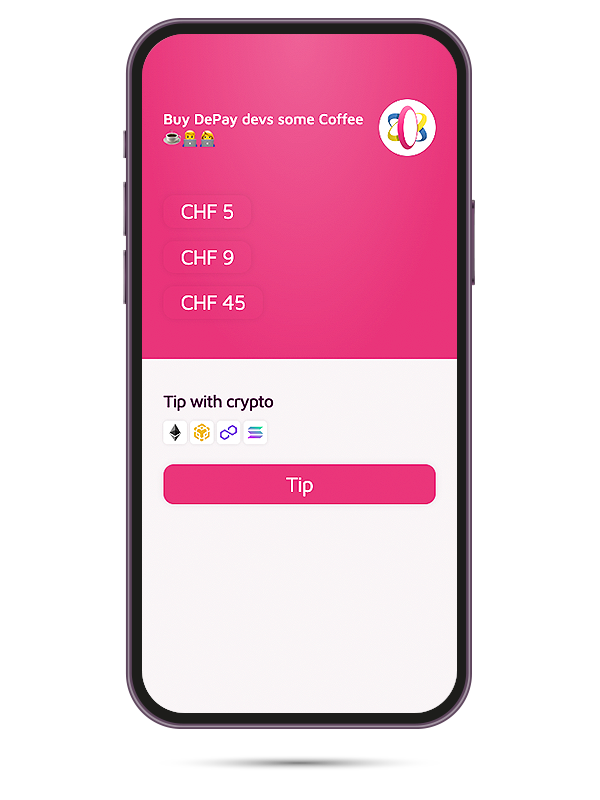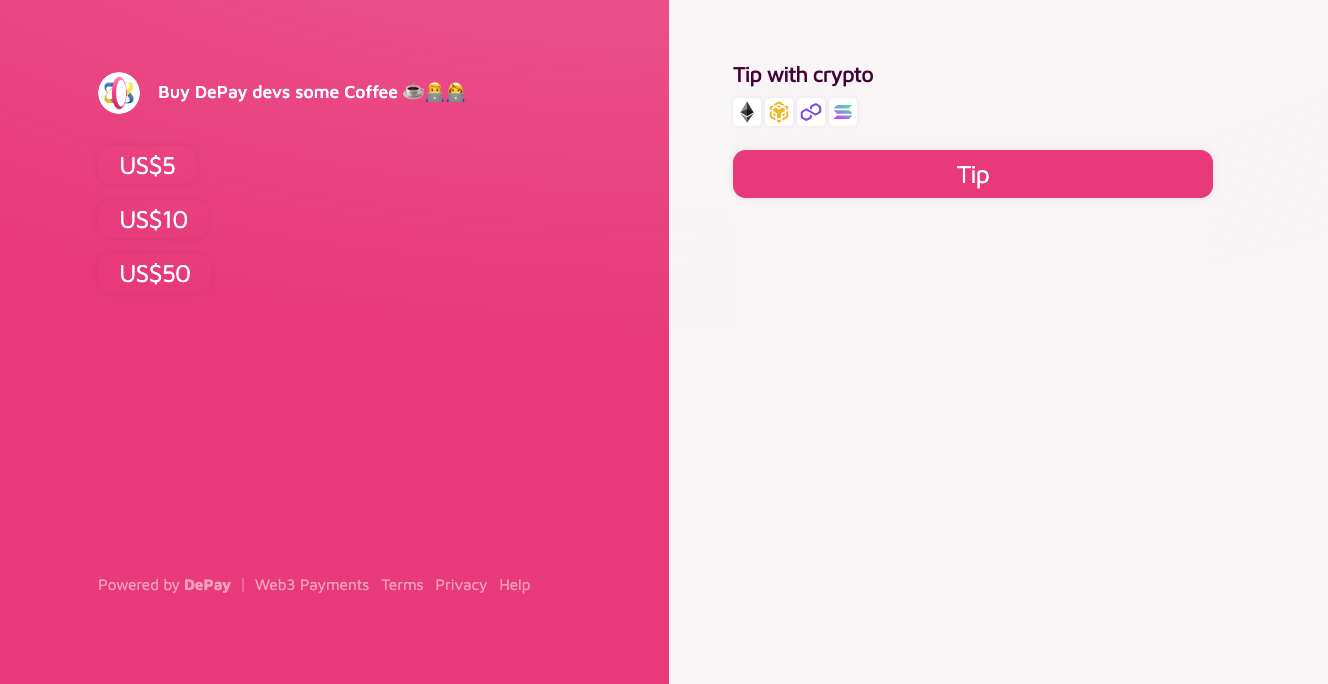Web3 Donation Link
Just create a link and start receiving donations.
Example
https://link.depay.com/1Ylujunhrm59HyLFuv7WwZ
On Mobile

On Desktop

Step by step
Create new link
Go to the DePay App on https://app.depay.com and create a Payment Link via Links > New Link and select Donation Link.
Charity/Foundation
Enter a name for the charity/foundation in order to allow users to understand who is receiving the donation.
You can also upload an image to represent the charity/foundation visually.
Cause/Project
Enter a name for the cause/project in order to allow users to understand what they are donating for.
You can also upload an image to represent the cause/project visually.
Tokens
Configure which tokens on which blockchains you want to receive as donations.
Select as few tokens per blockchain as possible, but select at least 1 token per blockchain for every blockchain you want to support.
Receiver
Enter the addresses that are supposed to receive the donations. One per token. You can use the same address for multiple tokens if that address supports receiving these tokens. Double-check the entered addresses, as an incorrect address can lead to a loss of donations.
Amounts
Enter up to 3 suggested amounts that the user can select quickly to perfom a donation.
Branding/Colors
You can select a primary color that will be used for the payment experience ensuring brand continuity throughout the payment experience.
Collect Data
Payment Links allow you to gather the following, additional information from your users:
- Full Name
- Shipping Address
- Country
- Quantity
User Flow
Configure what is supposed to happen after a payment has been performed and validated succssfully:
- Redirect users back to you
- Show a payment confirmation without redirecting users back to you
E-Mail Confirmations
You can configure Payment Links to automatically send payment confirmations per email after a successful payment:
- Send confirmation to your users
- Send confirmation to yourself
Callback Request
If your systems need to be informed about incoming payments (e.g. for automation) configure a callback request.
Once the payment has been succesfully completed and validated the configured callback endpoint will receive the following request:
e.g. the configured callback endpoint is https://example.com/payments/depay/callback
POST https://example.com/payments/depay/callback
{
"status": "success",
"failed_reason": undefined,
"blockchain": "ethereum",
"transaction": "0xd4a9424440f6010af1bec311dda4e23d4f0016f4cc215da84a41650150ecb8b7",
"sender": "0x29b0d4cb9cFfEB360067199cf026dfD4854A8aB0",
"nonce": "1",
"receiver": "0x29b0d4cb9cFfEB360067199cf026dfD4854A8aB0",
"token": "0xa0bEd124a09ac2Bd941b10349d8d224fe3c955eb",
"decimals": 18,
"commitment": "confirmed",
"confirmations": 1,
"after_block": "13609144",
"amount": "822.5",
"fee_amount": undefined,
"fee_receiver": undefined,
"payload": {
"link_id": "xxNdddVnbN02f0Enrav8L"
},
"secret_id": "74417770-e6ac-4ae8-b027-0657600d7bad",
"callback": "https://webhook.site/74417770-e6ac-4ae8-b027-0657600d7bad",
"release": true,
"forward_to": "https://example.com/payments/depay/confirmation",
"forward_on_failure": false,
"confirmed_at": "2021-11-25T12:54:52.332Z",
"created_at": "2021-11-25T11:17:13.833Z",
"updated_at": "2021-11-25T12:54:52.334Z"
}
Other response codes but 200 will be considered a failed callback and will be retried up to 25 times over approx. 21 days.
Payment callbacks will retry failures with an exponential backoff using the formula (retry_count * 4) + 15 + (rand(30) (retry_count + 1)) (i.e. 15, 16, 31, 96, 271, ... seconds + a random amount of time).
Verify communication
On your link page on app.depay.com you will find a dedicated public key once you have activated "Send callback". Store and use it in your application to verify all communication from DePay's APIs to your systems is authentic.
DePay APIs include an x-signature header with all requests sent to your systems.
Use that x-signature header together with the stored public key to verify the request is authentic.
DePay employs RSA-PSS with a salt length of 64 and SHA256 to sign request bodies. The signature is then sent base64 safe URL-encoded via the x-signature header.
- JavaScript
- Java
- Ruby
- PHP
- Other
Use DePay's verify-js-signature package for JavaScript & Node:
import { verify } from '@depay/js-verify-signature'
let verified = await verify({
signature: req.headers['x-signature'],
data: JSON.stringify(req.body),
publicKey,
});
if(!verified){ throw('Request was not authentic!') }
Some JavaScript frameworks modify req.body by default, which can break signature verification. If you encounter issues verifying the signature, try using the raw, unprocessed request body for verification:
app.use(express.json({
verify: (req, res, buf, encoding) => {
req.rawBody = buf.toString(encoding);
}
}));
let verified = await verify({
signature: req.headers['x-signature'],
data: req.rawBody,
publicKey,
});
public static boolean verifySignature(String signature, String requestBody) throws Exception {
// Decode the Base64 signature
byte[] decodedSignature = Base64.getUrlDecoder().decode(signature);
// Convert PEM public key to PublicKey instance
String pemPublicKey = PUBLIC_KEY_STR
.replace("-----BEGIN PUBLIC KEY-----", "")
.replace("-----END PUBLIC KEY-----", "")
.replaceAll("\\s", "");
byte[] publicKeyBytes = Base64.getDecoder().decode(pemPublicKey);
X509EncodedKeySpec keySpec = new X509EncodedKeySpec(publicKeyBytes);
KeyFactory keyFactory = KeyFactory.getInstance("RSA");
PublicKey publicKey = keyFactory.generatePublic(keySpec);
// Initialize Signature with RSA-PSS
Signature rsaPssSignature = Signature.getInstance("RSASSA-PSS");
PSSParameterSpec pssParams = new PSSParameterSpec(
"SHA-256",
"MGF1",
MGF1ParameterSpec.SHA256,
64,
1
);
rsaPssSignature.setParameter(pssParams);
rsaPssSignature.initVerify(publicKey);
rsaPssSignature.update(requestBody.getBytes(StandardCharsets.UTF_8));
// Verify the signature
boolean isVerified = rsaPssSignature.verify(decodedSignature);
return isVerified;
}
public_key = OpenSSL::PKey::RSA.new(STORED_PUBLIC_KEY)
signature_decoded = Base64.urlsafe_decode64(request.headers["X-Signature"])
data = request.raw_post
verified = public_key.verify_pss(
"SHA256",
signature_decoded,
data,
salt_length: :auto,
mgf1_hash: "SHA256"
)
raise 'Request was not authentic' unless verified
use phpseclib3\Crypt\RSA;
use phpseclib3\Crypt\PublicKeyLoader;
$signature = $request->get_header('x-signature');
$signature = str_replace("_","/", $signature);
$signature = str_replace("-", "+", $signature);
$key = PublicKeyLoader::load($public_key)->withHash('sha256')->withPadding(RSA::SIGNATURE_PSS)->withMGFHash('sha256')->withSaltLength(64);
if( !$key->verify($request->get_body(), base64_decode($signature)) ) {
throw new Exception("Request was not authentic");
}
You can read up on how to verify RSA PSS signatures in other programming languages: here.
Form Data
Form data entered during the payment is transported via the payload attribute:
{
"payload": {
"full_name": "Mister Smith",
"email": "test@example.com",
"shipping_address": "738 S. Wentworth Street, Bronx, NY 10466",
"billing_address": "738 S. Wentworth Street, Bronx, NY 10466",
"country": "US",
"quantity": 5,
"usd_value_received": 100.10,
"custom_values": [
{ name: "Discord Name", value: "Ninja#123" },
{ name: "Age", value: 18 }
]
}
}
Discounts
You can add discounts to your payment link.
Set the percentage of the applied discount and select the condition that needs to be met in order to apply the discount.
Select "Owns Token" as condition in order to apply the discount to customers owning the selected token.
Select "Owns NFT" as condition in order to apply the discount to customers owning the selected NFT.
Integrate
Once you've provided all required information the app will generate a Payment Link that you can use.
Send your users to the link in order to perform payments as configured.
Inject Payload Data
You can append get parameters to the generated payment link in order to inject payload data which will become part of the payment callback request.
This e.g. allows you to track individual users or sessions by id throughout the payment flow.
https://link.depay.com/6KFBECVsokSt0UKOAug8CI?payload[user_id]=1234567
or multiple parameters
https://link.depay.com/6KFBECVsokSt0UKOAug8CI?payload[user_id]=1234567&payload[session_id]=89
Those values will reappear in the payment callback request in the following way:
{
"payload": {
"injected": {
"user_id": 1234567,
"session_id": 89
}
}
}
Forward Parameters
If you have configured a redirect as part of your link, any passed GET-paramter will be forward. This allows you to forward certain paramters to your system through the link payment.
payload GET-parameters will NOT be forward upon redirect. They are only used to enrich the callback payload.
Example
Redirect is https://example.com?step=confirmation
You add the following GET-parameter when sending users to the payment link:
https://link.depay.com/xxNdddVnbN02f0Enrav8?user=123
Users will be redirected after successful payment to the following URL:
https://example.com?user=123&step=confirmation
Finality
DePay employs two distinct confirmation levels for payment validation based on the transaction value and the underlying blockchain's characteristics. Payments below USD $1,000 are designated as "confirmed" after a single block confirmation. In contrast, payments valued at USD $1,000 or above receive the "finalized" status, which necessitates varying block confirmations depending on the specific blockchain in use:
For an in-depth overview, explore the extended validation section.